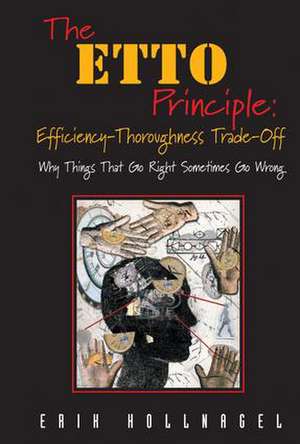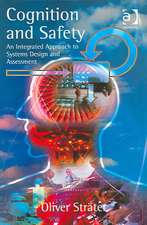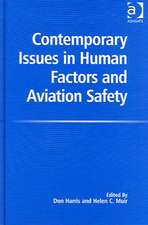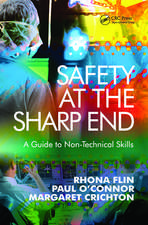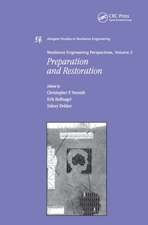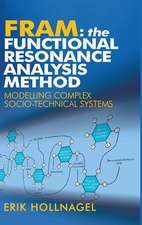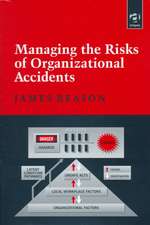The ETTO Principle: Efficiency-Thoroughness Trade-Off: Why Things That Go Right Sometimes Go Wrong
Autor Erik Hollnagelen Limba Engleză Hardback – 28 mai 2009
| Toate formatele și edițiile | Preț | Express |
|---|---|---|
| Paperback (1) | 370.28 lei 3-5 săpt. | +17.42 lei 7-13 zile |
| CRC Press – 28 mai 2009 | 370.28 lei 3-5 săpt. | +17.42 lei 7-13 zile |
| Hardback (1) | 999.46 lei 6-8 săpt. | |
| CRC Press – 28 mai 2009 | 999.46 lei 6-8 săpt. |
Preț: 999.46 lei
Preț vechi: 1218.86 lei
-18% Nou
Puncte Express: 1499
Preț estimativ în valută:
191.24€ • 199.67$ • 158.28£
191.24€ • 199.67$ • 158.28£
Carte tipărită la comandă
Livrare economică 05-19 aprilie
Preluare comenzi: 021 569.72.76
Specificații
ISBN-13: 9780754676775
ISBN-10: 0754676773
Pagini: 162
Ilustrații: includes 6 tables & 25 figures
Dimensiuni: 156 x 234 x 11 mm
Greutate: 0.43 kg
Ediția:New ed
Editura: CRC Press
Colecția CRC Press
ISBN-10: 0754676773
Pagini: 162
Ilustrații: includes 6 tables & 25 figures
Dimensiuni: 156 x 234 x 11 mm
Greutate: 0.43 kg
Ediția:New ed
Editura: CRC Press
Colecția CRC Press
Public țintă
Academic and Professional Practice & DevelopmentCuprins
Contents: Prologue; The need to understand why things go wrong; From rationality to ETTOing; Explaining human irrationality; Efficiency-thoroughness trade-off in practice; The usefulness of performance variability; ETTOs of the past; ETTOs of the future; Epilogue; Index.
Notă biografică
Erik Hollnagel (PhD, Psychology) is Professor and Industrial Safety Chair at MINES ParisTech (France), Professor Emeritus at University of Linköping (Sweden), and Visiting Professor at the Norwegian University of Science and Technology (NTNU) in Trondheim (Norway). Since 1971 he has worked at universities, research centres and industries in several countries and with problems from several domains, including nuclear power generation, aerospace and aviation, air traffic management, software engineering, healthcare, and land-based traffic. His professional interests include industrial safety, resilience engineering, accident investigation, cognitive systems engineering and cognitive ergonomics. Erik Hollnagel has published more than 250 papers and authored or edited 13 books, some of the most recent titles being Resilience Engineering Perspectives: Remaining Sensitive to the Possibility of Failure (Ashgate, 2008), Resilience Engineering: Concepts and Precepts (Ashgate, 2006), Joint Cognitive Systems: Foundations of Cognitive Systems Engineering (Taylor & Francis, 2005) and Barriers and Accident Prevention (Ashgate, 2004). He is Editor-in-Chief of the Ashgate Studies in Resilience Engineering series and, together with Pietro C. Cacciabue, Editor-in-Chief of the international journal Cognition, Technology & Work.
Recenzii
'Hollnagel combines an accessible style with rigorous logic as he invites us to examine in new ways the socio-technical systems that have become so essential to our world. His observations of the ETTO Principle lead to insights about human and social performance variability and expose the limits of traditional bimodal analytical methods. Healthcare practitioners will find inspiration and greater understanding of the challenges of providing safe care in an underspecified and frequently intractable system. Bravo!' Rob Robson, Chief Patient Safety Officer, Winnipeg Regional Health Authority, Canada 'This is an impressive book, simultaneously bold and reasonable. Hollnagel, in his highly readable style, lays out a simple but profound principle - the tradeoff between thoroughness and efficiency - and uses it to cut through all kinds of sterile debates in order to provide valuable insights about human behavior.' Gary Klein, author of Sources of Power: How People Make Decisions 'With characteristic flair, Erik Hollnagel has cleverly captured in The ETTO Principle the pervasive problem of how we balance efficiency with thoroughness in our working life. Deftly blending material from decision science, accident analyses and risk management, he leads the reader through a fascinating series of adverse events, identifying the ETTO components to produce new insights into causal influences. Provocative reading for those interested in business efficiency and organisational safety.' Rhona Flin, University of Aberdeen, UK 'The ETTO principle resonates as a practical and workable premise from which to begin to address the complexity of healthcare. The specialized reductionist models that have been purported to apply to healthcare (Swiss Cheese, Root Cause Analysis) may be asking the wrong question. By biasing our view to the "retrospectoscope" we may chose not to look forward, at the complexity, context and trade offs in which modern healthcare occurs. We're using the ETTO Princ
Descriere
Accident investigation and risk assessment have for decades focused on the human factor, particularly ’human error’. This bias towards performance failures leads to a neglect of normal performance. It assumes that failures and successes have different origins so there is little to be gained from studying them together. Erik Hollnagel believes this assumption is false and that safety cannot be attained only by eliminating risks and failures. The alternative is to understand why things go right and to amplify that. The ETTO Principle looks at the common trait of people at work to adjust what they do to match the conditions. It proposes that this efficiency-thoroughness trade-off (ETTO) is normal. While in some cases the adjustments may lead to adverse outcomes, these are due to the same processes that produce successes.
